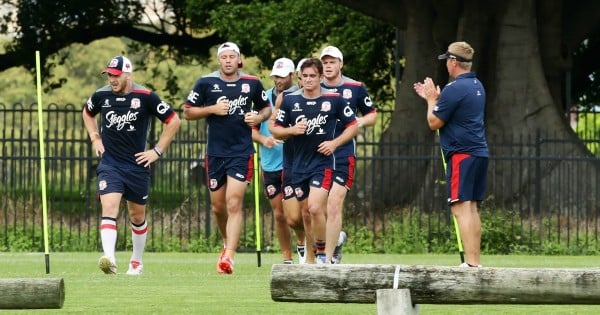
This week, the Sydney Roosters visited Holly Wainwright’s daughter’s school. They spoke to students about “well-being and a healthy lifestyle”.
Mamamia’s Holly Wainwright says that with players up on assault charges and other players deeply disgraced, the Roosters have no place talking to kids about health – but Editor, Kate de Brito disagrees. She thinks that a few bad eggs is marring the reputation of a good group of men.
Here, they have it out over whether footy players should be in schools…
HOLLY WAINWRIGHT
“This week, the school was delighted to have players from the Sydney Roosters on campus… the purpose of the visit was to discuss well-being and tips on maintaining a healthy lifestyle.”
These are the words that splattered my laptop with tea this morning, as I rushed through a pre-work reading of my child’s school newsletter.
Healthy lifestyle?
Excuse me while I recall some of the Roosters’ most recent headline-grabbing incidents.
Just two days ago, this report on one of the club’s stars, Shaun Kenny-Dowall, who’s in court on charges of alleged domestic violence. An ABC report reads:
“Documents filed with the court show Kenny-Dowall allegedly assaulted Ms Peris on seven separate occasions at Coogee and Maroubra between October 2014 and June 2015.
He also allegedly destroyed her mobile phone, used his phone to menace or harass her in May last year and stalked or intimidated her in June.”
The week before, the Roosters were famously in damage control over their co-captain, Mitchell Pearce – no wet-behind-the-ears youth, at 26 – when a video of him drunk out of his mind appeared to show him manhandling an unwilling woman, sexually harrassing a dog (yes, I know) and allegedly pissing all over someone’s lounge.



Top Comments
No way! The age of hero worshipping these idiots has got to come to an end. Sure, maybe only a few are caught doing stupid things but you only have to catch 10 minutes of some football show to see that even the 'mature' ex- players who have been chosen for their speaking abilities act like sexist fools most of the time. There has got to be better role models out there, not to mention people more qualified to educate on healthy lifestyles. End rant!!
Sorry but they have had chance after chance after chance as an organisation. Until those on full-time contracts have a clause that prohibits them from drinking and drug-taking and steroid abuse and domestic violence with one strike and you're out, I want them nowhere near my children. Absolute hypocrisy otherwise.